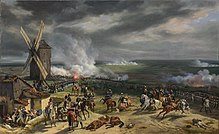1792 in France
| |||||
| Decades: | |||||
|---|---|---|---|---|---|
| See also: | Other events of 1792 History of France • Timeline • Years | ||||
Events from the year 1792 in France.
Incumbents
[edit]- Monarch: Louis XVI (until 21 September; monarchy abolished)[1]
- The Legislative Assembly (until 21 September)[2]
- The National Convention (from 21 September)[2]
Events
[edit]March
[edit]- 25 March – The Legislative Assembly agrees that the guillotine should be used for judicial executions.
April
[edit]- 20 April – The Legislative Assembly declares war against Austria, starting the French Revolutionary Wars and War of the First Coalition.
- 25 April
- Highwayman Nicolas Pelletier becomes the first person executed by guillotine in France, in what becomes the Place de l'Hôtel de Ville in Paris.
- La Marseillaise, the French national anthem, is composed by Claude Joseph Rouget de Lisle in Strasbourg.
June
[edit]- 13 June – Prussia declares war against France.
- 20 June – Demonstration of 20 June 1792.
August
[edit]
(Musée de la Révolution française)
- 10 August – French Revolution: Insurrection of 10 August 1792 – The Tuileries Palace is stormed and Louis XVI of France is arrested and taken into custody.
- 20 August – War of the First Coalition: Battle of Verdun – Prussia defeats France, opening a route to Paris.[3]
- 21 August – Royalist Louis Collenot d'Angremont becomes the first person executed by guillotine for political reasons, in the Place du Carrousel in Paris.
September
[edit]- 2–19 September – 1792 French National Convention election.
- 2–7 September – French Revolution: September Massacres – Rampaging mobs in Paris slaughter three Roman Catholic bishops and more than 200 priests, together with at least 1,000 criminals.
- 9 September – 9 September massacres at Versailles.
- 11 September – Six men steal some of the former French Crown Jewels from a warehouse, where the revolutionary government has stored them.
- 14 September – Radical antimonarchist Thomas Paine flees from England to France, after being indicted for treason. He is tried in absentia during December and outlawed.[4]
- 20 September – French Revolutionary Wars: Battle of Valmy – The French revolutionary army defeats the Prussians under the Duke of Brunswick after a 7-hour artillery duel.

- 21 September – French Revolution: A Proclamation of the abolition of the monarchy by the French Convention goes into effect, and the French First Republic is established, effective the following day.
- 22 September – French Revolution: The Era of the historical French Republican Calendar begins.
November
[edit]- 6 November – War of the First Coalition: Battle of Jemappes – Austrian armies under the command of Duke Albert of Saxe-Teschen are defeated in Belgium (at this time part of the Austrian Netherlands) by the French Army led by General Charles François Dumouriez.[5]
- 19 November – The National Convention passes a resolution pledging French support for the overthrow of the governments of other nations.[6]
December
[edit]- 26 December – The trial of Louis XVI of France begins.
Ongoing
[edit]Full date unknown
[edit]- Claude Chappe successfully demonstrates the first semaphore line, between Paris and Lille.
- Barthélemy Catherine Joubert, future general, becomes sub-lieutenant.
Births
[edit]- 21 May – Gaspard-Gustave Coriolis, engineer, scientist
- 1 August – Pierre Solomon Ségalas d'Etchépare, physician[7]
- 9 August – Charles-François Lebœuf, sculptor
- 25 August – Jean-Baptiste Duvergier, lawyer
- 28 November – Victor Cousin, philosopher
Deaths
[edit]
- 1 March – Jean Godin des Odonais, cartographer and naturalist
- 12 May – Charles Simon Favart, dramatist
- 29 July – René Nicolas Charles Augustin de Maupeou, Chancellor of France
- 23 August – Arnaud II de La Porte, statesman (executed)
- 25 August – Jacques Cazotte, writer (executed)
- 3 September – Marie Thérèse Louise of Savoy, Princesse de Lamballe, princess, courtier to Marie Antoinette (killed in September Massacres)
- 8 September – Charles d'Abancour, statesman (killed in September Massacres)
- 22 October – Guillaume Le Gentil, astronomer
- 7 December – Marie Jeanne Riccoboni, novelist
- Full date unknown – Nicholas Adam, grammarian
See also
[edit]References
[edit]- ^ "Louis XVI | Biography, Reign, Execution, & Facts | Britannica". www.britannica.com. Retrieved 25 June 2022.
- ^ a b Bentham, Jeremy (2002). Rights, Representation, and Reform: Nonsense Upon Stilts and Other Writings on the French Revolution. Oxford University Press. p. 291. ISBN 978-0-19-924863-6.
- ^ Parker, Geoffrey (2008). The Cambridge Illustrated History of Warfare. New York: Cambridge University Press. p. 195. ISBN 978-0-521-73806-4. Retrieved 2012-01-22.
- ^ Palmer, Alan; Palmer, Veronica (1992). The Chronology of British History. London: Century Ltd. pp. 232–233. ISBN 978-0-7126-5616-0.
- ^ Evans, Eric J. (2014). The Forging of the Modern State: Early Industrial Britain, 1783–1870. Routledge.
- ^ Bisset, Robert (1822). The Reign of George III: To which is Prefixed a View of the Progressive Improvements of England in Property and Strength to the Accession of His Majesty. Vol. 2. Edward Parker. p. 855.
- ^ Ségal, Alain (2008). "Outline of the work of Pierre Salomon Ségalas of Etchépare (1792-1875)". Histoire des sciences médicales. 42 (2). France: 199–204. ISSN 0440-8888. PMID 19230322.


 French
French Deutsch
Deutsch